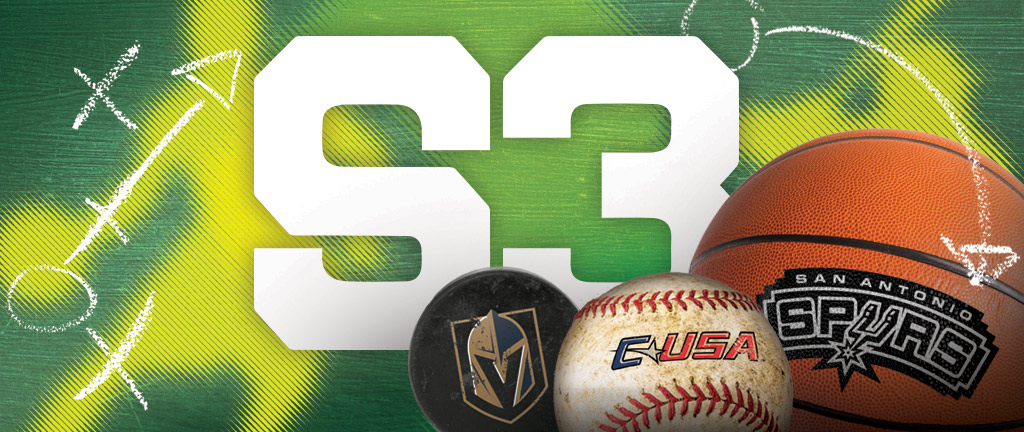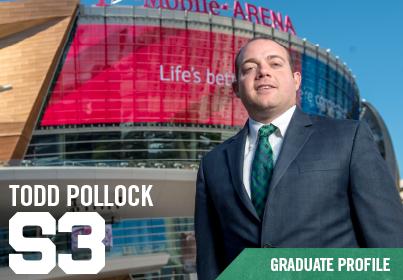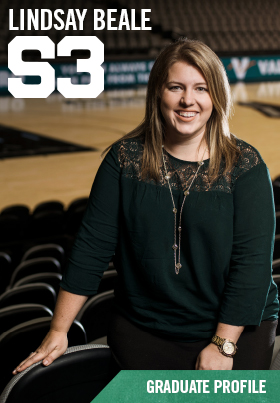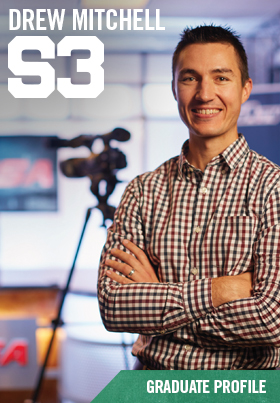Sports Sponsorship & Sales
Innovative program scores solid careers
Dr. Darryl Lehnus, EdD '93, stood watch over a spacious meeting room at the downtown Waco Hilton Hotel one Friday morning in early November, managing the process of roughly 20 six-minute interview sessions with the countenance of a proud father.
Meanwhile, Dr. Kirk Wakefield, MBA '81, mingled with a half dozen students and several visiting team and company representatives in the hallway.
This was Baylor's Sports Sponsorship and Sales Senior Pro Day, a jobs fair of sorts that allows the program's seniors to meet with prospective employers--and there are a lot of them.
"We work on a 100-percent placement rate for our graduates," said Lehnus, senior lecturer and director of the Baylor Center for Sports Sponsorship and Sales, a major that Hankamer School of Business (HSB) Dean Terry Maness nicknamed S3 early in its existence.
"It's been a good relationship between us and the professional teams," Lehnus said.
"I feel bad because all of them won't get a Baylor graduate."
S3 was the brainchild of Wakefield, HSB marketing professor and holder of The Edwin W. Streetman Professorship in Retail Management, and Lehnus in the early 2000s as part of former Baylor president Robert Sloan's push for more innovative degree programs as part of the Baylor 2012 vision. Little more than a decade later, the program remains the nation's only complete sports sales major and is a hotbed for sports teams and companies looking for new employees.
"It's the way Baylor University, Dr. Lehnus and Dr. Wakefield really work with the students to select a track," said Adam Vogel, director of inside sales for the New York Mets. Vogel was one of more than 20 team representatives at the November Pro Day, along with representatives from companies such as Phillips 66, StubHub, Major League Baseball Advanced Media, the National Basketball Association and sport electronics giant Daktronics.
"You know you're getting a focus from the students, which helps them out and in turn helps out the prospective employers," Vogel said. "You know with Baylor S3 graduates that you're going to get hungry, driven professionals that know the direction they want to go and have applicable experience in that field. That gives you much more confidence as a recruiter to invest in a student."
According to Lehnus, the S3 program is as much about weeding out dispassionate students as it is about teaching them.
"If you want to work a lot of hours for low pay, go into sports," Lehnus said. "But if you have a heart and a passion for the industry, you can be successful and you can make some money, particularly on the sales side of it. You're going to start out at the bottom, and you're going to make probably $40,000 below what some other business major may start out at; but, in two or three years, there is no restriction in advancement because teams and companies don’t care how old you are."
One of the first S3 graduates--Todd Pollock, BBA '06, MBA '14--is a prime example of that. Less than two years after completing the S3 program, Pollock was manager of sales and services for the National Hockey League's Los Angeles Kings. Two years later, at age 25, he was manager of ticketing and suites for the National Football League’s San Francisco 49ers.
"They don't care how old you are but really how good you are," Lehnus said. "If you're generating $1 million in revenue, they're going to pay you accordingly in commission. In sports, you really do control your own destiny."
Pollock's destiny has not been devoid of chance, however. In 2011, the York, Maine, native returned to the East, overseeing Temple University's IMG College properties for two years before deciding to leave the sports business. Pollock returned to Baylor, completed his MBA and had a full-time offer from IBM, with which he interned the previous summer.
While at a Baylor-Iowa State men's basketball game in January 2015, Pollock received a call from one of his former Los Angeles Kings bosses who told him about Las Vegas' bid to get a professional hockey team. The ownership group that was pursuing the franchise needed someone to run ticket sales and premium seating sales for 90 days.
"I have this job with IBM, and I’m moving to Minneapolis in a few months," Pollock said. "I had a call with the ownership group the next day, and the following day they flew me out. Two days later, I moved to Las Vegas, and I haven’t left."
Today, Pollock is vice president for ticketing and suites for the NHL Las Vegas franchise--the Vegas Golden Knights--that will begin play in the 2017-2018 season. And he is a major part of the franchise’s existence.
"It wasn't guaranteed to come to fruition," he said. "Teams say they're going to move to Vegas. Teams talk about building arenas and nothing pans out. So, it was a gamble. This is the first professional sports team in Las Vegas--in the state of Nevada."
Pollock said it was about 14 months into his time at Las Vegas that he knew his gamble had paid off. The league office gave the ownership group a goal to sell 10,000 tickets in six months. Pollock hit that goal in less than two months.
"It really wasn't a tough decision for me to stay and not go to IBM," Pollock said. "I became so invested in it with my time and my heart that I wanted to see it through."
Planting the Seed
Lehnus served as Baylor’s associate athletic director for corporate sales from 1986 to 2003. In that time, he encountered numerous student interns who all had the same question: How do I get into sports?
"We have the answer to that question," Lehnus, who became a professor in HSB upon leaving athletics, said of the S3 program. Initially, he and Wakefield, who joined Baylor in 2002, explored the possibility of a sports marketing undergraduate program. After a year of research, the conclusion was clear: no jobs.
That led to the question of sales. Lehnus and Wakefield met with all the major sports franchises in Texas and asked the same question: Where do you start employees?
"Nine for nine, they said, 'We start people in sales, but nobody is creating that person for us,'" Lehnus said. "They had to get people from communications or sports marketing programs or physical education majors. Nobody had a sports sales major. Baylor already had a professional sales major. So, we leveraged it and asked the teams, 'If we start something like that, would you guarantee us positions?' 'Absolutely.'"
Since 2006, Baylor has placed S3 graduates with more than 40 professional sports teams and sports business entities. That list includes the NBA's San Antonio Spurs and Cleveland Cavaliers, Major League Baseball's New York Yankees and San Diego Padres, the NFL's Tampa Bay Buccaneers and Kansas City Chiefs, the NHL's New Jersey Devils and Columbus Blue Jackets, as well as Circuit of the Americas, Homestead Miami Speedway, NRG Energy and The Marketing Arm in Dallas.
"We talked with teams, and they told us what they wanted. We came back and with their help created the major," Lehnus said.
Wakefield likened the program's genesis to Joseph's story in the Bible.
"God was with him at the right place and the right time," Wakefield said. "We've been blessed by being in the right place at the right time. And we're in a unique position. When you Google 'sports sponsorship and sales,' we're the only one. But it's not enough to be unique; it's being unique and good. Otherwise, you wouldn't have all these teams coming here to recruit."
Just as word of Baylor's S3 program spread like wildfire in the sports business community, it also became quickly recognizable for incoming Baylor students. Fort Worth native Lindsay Beale, BBA '10, is senior manager for group sales with Spurs Sports and Entertainment in San Antonio. She attended a breakout session for prospective S3 majors while at a Baylor Winter Premiere.
"That solidified that I was going to go to Baylor, and that was the program I wanted to major in," she said. "The connections they have with teams was awesome right from the start and unparalleled in the sports industry."
Beale interned with the Spurs while in the S3 program and was hired by the organization after completing her degree. She said the experience she gained in the program benefited her greatly.
"One of the things Baylor does well is teaching ethics and values," she said. "Learning at Baylor how to make high-level decisions and looking at how they impact all the stakeholders has served my career well."
Current Baylor senior Katie Staiger, an S3 major and member of Baylor's volleyball team, gravitated to the major during her first two years at the university.
"I knew I wanted to work in sports but be in business," she said. "The biggest thing that stands out about it is the strong connections they have. They really prepare students to get hired."
Staiger, who participated in the Senior Pro Day, said it felt more like she was interviewing the teams than the other way around.
"You're so well prepared for the field with specific skills that it was more like they were trying to sell you on their organization," she said. "You can tell from that interaction how esteemed the major is."
Lehnus credits Baylor's pre-existing infrastructure for much of the program's quick success.
"We were blessed that we had the role-play rooms, we had the curriculum already in the professional sales program; all we had to do was create the classes," Lehnus said. "We were writing our own textbooks and content."
Changing the Game
Lehnus said the biggest challenge he and the other S3 professors have is helping students rethink their perception of sales.
"We have to show them that sales isn't talking, it's listening," he said. "Don't dare walk in with prepared presentation--here's what you need to buy from me. That's assuming you know more about the person’s business than they do. Professional sales people ask questions and listen, and then help solve problems."
Lehnus also said the process of sales has changed drastically in the past few years and that some sports organizations are struggling to adjust.
"Cold calling is dead," he said. "But teams are still saying you have to make 80 to 100 calls a day. People are connecting differently than they were just two or three years ago. Our goal over the next couple of years is to change that mentality. The phone isn’t dead, but it has a different place in the process."
Baylor S3 students get hands-on experience in this evolution through the program's Connection Center, which is located in the Paul L. Foster Campus for Business and Innovation.
"We actually take on projects for the Rangers or Astros and work selling tickets," Lehnus said. "As juniors, our students learn how to talk with people, how to get past gatekeepers, handle objections, know how to ask good questions. We have students that have made 2,000 connections before they graduate from college. Our students are the only ones graduating college with that kind of experience."
Some S3 graduates have gone to the other side of the sales process. A sales representative who builds a good report with a company through the sponsorship negotiation can soon find himself or herself working for that company. Likewise, non-sales management jobs in the sports world are available for Baylor S3 graduates. Such was the case for Drew Mitchell, who last summer was hired as associate commissioner and chief revenue officer (CRO) for Conference USA after six years as CRO for the NBA Development League’s Texas Legends.
Mitchell, who along with Pollock was part of the first S3 graduating class, now sits on the program's board of directors, an advisory committee that features people from various sports teams as well as companies such as Schlotzsky's, State Farm and Phillips 66. Board members also include executives with major sports franchises, such as Chicago Cubs. Note: See the Nov. 14 Baylor Proud for a story on Colin and his brother Chris Faulkner, BBA’01, senior manager of premium seating for the Denver Broncos. Both brothers were a part of championship seasons for their teams in 2016.
Baylor S3 students get to meet with board members through monthly S3 Club seminars and networking events.
"The people they get to interact with in their time as a student, and the internship opportunities and projects in class, it's such a great opportunity," Mitchell said. "And having that sales experience before graduating, that's what give you a bit of a competitive advantage over other recent hires and graduates from other programs."
S3 majors choose between a sales track or customer relationship management (CRM) and analytics. Wakefield developed the latter track in recent years and said it is a booming market.
"Every team is adding people in that area," he said. "All the data that teams get when someone buys a ticket goes into a system. Somebody has to analyze that data."
Baylor placed nine graduates in that field last year and as many as 15 CRM graduates are expected this year.
Undoubtedly, Baylor's S3 program has made waves in the sports industry. Wakefield said it's hard for him and Lehnus to take credit for the program's success.
"It's partly about being at Baylor and partly about God's design and engineering circumstances for His glory," Wakefield said. "But it is fun, and we sit there sometimes and say, 'Can you believe this?' There are several people that say, 'We heard about the S3 program. Can we come to the Senior Pro Day?' That part is really fun."



